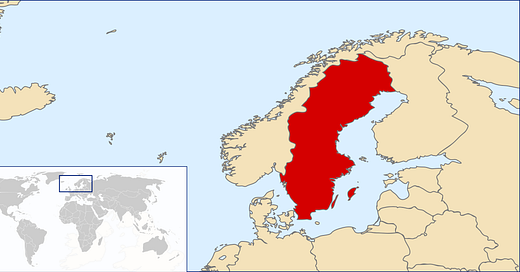Hi,
Last Friday, after receiving a yet-to-even-be-fully-confirmed invitation to a Swedish literary event a few months from now, I did two things: a) subscribed to a few news podcasts in Swedish and b) went out and bought a textbook called Colloquial Swedish. I am currently on page 238/300. Yes, in four days. I love being autistic.
So far my German is helping me a lot. Grammar and vocabulary are pretty similar. The modal particles ju, väl, nog, and nu (filler words that modify the tone of a sentence) work similarly to their Teutonic cousins. Many phrasal verbs like lära känna (to meet someone for the first time) match their German equivalent word for word. Even vocabulary that seems completely different is often parsable: ‘still’ – as in ‘even now’ – is most commonly noch in German and fortfarande in Swedish, but fortfahrend in German means ‘continuing’. Sometimes the German word is completely different but the Swedish is the same as the Dutch. (Don’t ask me how I know; I have never studied Dutch nor spent any significant amount of time in the Netherlands, but random linguistic facts simply come at me like flying plates and I duck some of them but not all. This is not to say I want the plates to stop.)
The pronunciation has a fair amount of overlap, too. There aren’t many sounds in Swedish that don’t exist in German, though sometimes they’re transcribed differently. Intonation-wise, though, Swedish has a beautiful Welsh-sounding down-then-up lilt on certain words with a double consonant. (These double consonants work nothing like the ones in Italian, since rather than stressing the consonants themselves like in Italian, in Swedish you instead shorten the preceding vowel. The Italian doppie are a fascinating beast long extinct from most other neo-Latinate languages; as far as I know, outside Italy the only other European language that has them is Finnish.)
I remain convinced that direct immersion is the best way to learn a language: reading, listening, speaking. But the textbook has expedited my theoretical understanding of the rules. To actually apply those rules when speaking without it being painfully slow, I do think you need to have deeply osmosed them rather than just having had everything explained — but the explanation helps with the osmosis, probably.
It’s also fun to think about what gets emphasised in a textbook, especially when native speakers wrote it. p192 of Colloquial Swedish offers no fewer than four ways of expressing measured Nordic indifference: det gör inget, sak samma, det struntar jag i and det bryr jag mig inte om. One of the reading comprehensions focuses on allemanssrätten, the right of everyone to access even privately owned natural spaces. I will not be availing of this liberty on my visit lest I wind up getting trampled by a moose, but good to know it’s there.
The textbook does suffer from the crippling debilitation of clearly being written for English people. There is a whole exercise devoted to practicing not inserting an unnecessary ‘r’ between vowels in Swedish, unlike in English where apparently everyone says ‘An arearrrr of disagreement’. It also has a couple of small mistakes in how it sets out the exercises and grammar, though I cannot comment much on the Swedish itself because it has been, I cannot stress enough, four days. On the whole I have found it a solid introduction to the language, though it’s possible the last 62 pages will let me down. Look at me, moderating my claims like a native-born Scandinavian.
*
Another thing I wanted to briefly touch upon: a minor but hilarious Irish political hubbub. Our new Ceann Cómhairle, or speaker of the parliament, does not speak Irish. This is a problem! Already she wasn’t able to respond effectively when our Taoiseach Micheál Martin accused Sinn Féin leader Mary Lou McDonald a bheith ag insint bréaga, i.e. of telling lies. Sinn Féin took the accusation to mean ‘being a liar’, i.e. a bréagadóir. Martin responded by defending the difference between the two. Hate the sin, lover the sinner, nach bhfuil.
This teacup storm demonstrates not only that a person chairing debates held partly in Irish should probably speak it themselves, but that maybe more people in Irish journalism should, too. The whole imbroglio is getting misreported as Martin denying that any mutation of the word ‘lie’ was used.* That said, I suppose it’s subjective anyway how many lies you can tell without it automatically making you a liar — arguably, none. And I am not, to be clear, defending Micheál Martin on Beyoncé’s internet, or indeed on Mary Lou’s.
I’ll keep yiz posted on the Swedish gambit. I think after the textbook I’ll just jump into reading the news; I’m already following the podcasts much better.
As it happens, I will be in Berlin this weekend during the German general election, though I don’t have a vote. I doubt anyone who does needs prompting from me, but I’ll say it anyway: AfD raus.
Till next time,
N
*Update: I wrote this before I saw Martin’s new statement claiming that ‘bréaga’ are not directly translatable as ‘lies’, but as ‘falsehoods’. It’s irrelevant anyway because it’s also unparliamentary to accuse someone of telling ‘falsehoods’, so what a strange slimy tactic to take.




